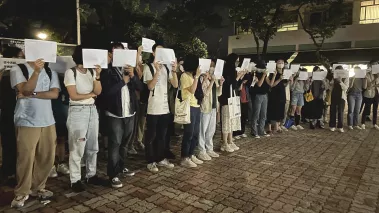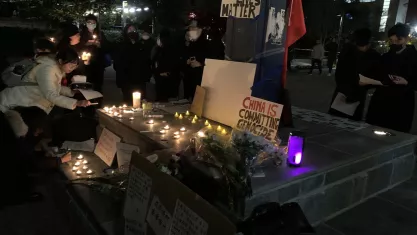Table of Contents
Protests are sweeping heavily censored China. How will American institutions respond?

AP Photo / Kanis Leung
Protesters hold up blank white papers during a commemoration for victims of a recent Urumqi deadly fire at the Chinese University of Hong Kong in Hong Kong, Monday, Nov. 28, 2022. Students in Hong Kong chanted “oppose dictatorship” in a protest against China’s anti-virus controls after crowds in mainland cities called for President Xi Jinping to resign in the biggest show of opposition to the ruling Communist Party in decades.
You’ve likely seen something unusual taking place this week. Thousands of people in cities and universities across China have joined mass demonstrations — sparked by a deadly fire in Urumqi, which many fear was worsened by the country’s pandemic lockdown policies — that are blossoming into broader protests decrying zero-COVID rules, authoritarianism, and, in some cases, President Xi Jinping specifically.
Seeking to both avoid and subvert the country’s notorious censorship policies, protesters have been carrying blank sheets of paper to acknowledge those who died in the fire and all the words protesters themselves are not allowed to voice. As it turns out, sometimes silence speaks volumes.
The country’s internet censors have worked even more aggressively than usual to match the glut of protest content being uploaded online. Popular microblogging platform Weibo is removing all evidence of protest footage, and WeChat and other apps show skewed results for the phrase “white paper.”
How the infamously authoritarian Chinese Communist Party will respond in the coming days is not yet clear, though police activity and surveillance are already increasing. Activists and advocates are watching with great concern that the CCP will respond heavy-handedly, as it has against past protests — with brutal, violent results.
Here in the United States, it’s worth asking how American institutions will respond to protests that raise uncomfortable issues for industries that frequently seek to avoid offending or opposing the CCP to protect their access to China — and sometimes even aid its censorship efforts.
Apple limits AirDrop — and its protest capabilities
Like other tech companies, Apple’s acquiescence to China’s censorship rules in recent years is well documented, sometimes even going beyond what is likely required by authorities. Just this month, Apple upped the ante when it limited AirDrop, a feature on iPhones that allows file-sharing to nearby Apple devices, so that users in China would have their AirDrop settings automatically turn off public availability after 10 minutes.

Emerson College investigates, suspends conservative student group for stickers criticizing China’s government
In 2019, Hong Kong’s protesters used AirDrop to organize and share information about protests as police crackdowns against them increased. More recently, individuals in mainland China used AirDrop to share posters critical of President Xi, referencing a lone individual’s daring protest on Beijing’s Sitong Bridge ahead of the CCP’s 20th National Congress in October of this year.
Curiously, Apple rolled out its new AirDrop restrictions in China only weeks after protesters used the tool to amplify the Sitong Bridge protest. The change will reportedly become Apple’s standard rule in the future — but the feature was rushed out only to Chinese phones, and done unexpectedly.
That the rollout was done so quickly after AirDrop was used to share anti-government images, and will now limit a tool that could’ve been utilized by China’s growing contingent of protesters, raises eyebrows. The CCP is responsible for the censorship it forces upon its own people, but it has certainly been aided by tech companies, including those in the United States, willing to either directly work to advance such censorship or to abide by such laws to retain market access.
More American tech and social media companies will likely face censorship and obfuscation efforts and demands if these protests continue. FIRE will be watching to see how they respond.
How will protests fare as they bloom across U.S. campuses?
As FIRE has pointed out many times, the Chinese government is an increasingly sore subject on campus. Among students, disputes over what can be said about China are escalating, often resulting in outright demands for administrative censorship of the CCP’s critics. Students like the Chinese dissidents at George Washington University fear being unmasked by administrators and their peers — their only way to speak freely is through anonymity.
Even worse, college administrators have actively censored student and faculty speech about China. In the case of Emerson College, the school punished a student group for distributing anti-CCP stickers — and then hid Twitter replies condemning its actions and even those referencing Winnie the Pooh, whose image has been used to mock Xi Jinping.
To put it mildly, universities, many of which maintain extensive ties to the country, frequently fall short of their commitment to free speech when it comes to political speech about China.
Universities now face another test as these protests spread onto campuses around the world, including in the U.S., and provoke a strong showing of support for Chinese dissenters and of backlash from their opponents. FIRE will keep a close eye on these developments to ensure universities abide by their legal and moral obligations to free expression, and respect students’ right to protest and to speak anonymously.

Any students who experience, or are threatened with, censorship should immediately contact FIRE. You have the right to express yourself — and, in the case of these protests, hold signs that pointedly speak no words at all.
Recent Articles
Get the latest free speech news and analysis from FIRE.

FIRE's 2025 impact in court, on campus, and in our culture

The trouble with banning Fizz

VICTORY: Court vindicates professor investigated for parodying university’s ‘land acknowledgment’ on syllabus


